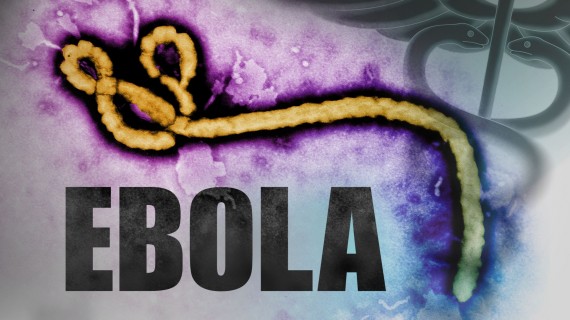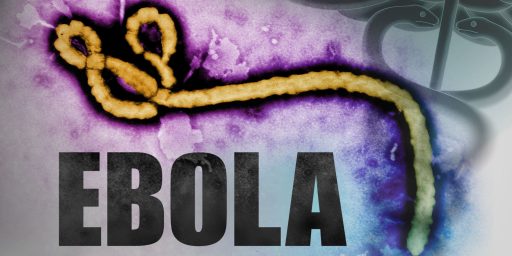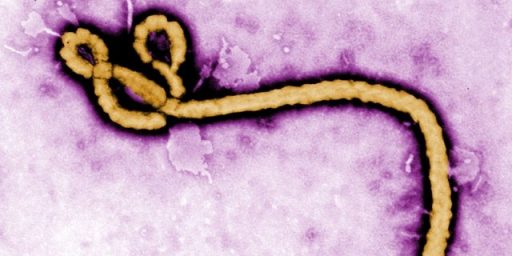New Ebola Vaccine Is 100% Effective
Big news in the war against a horrible virus.
In what seems to be major news from the world of medicine, doctors appear to have developed a completely effective vaccine against the Ebola virus:
In a scientific triumph that will change the way the world fights a terrifying killer, an experimental Ebola vaccine tested on humans in the waning days of the West African epidemic has been shown to provide 100 percent protection against the lethal disease.
The vaccine has not yet been approved by any regulatory authority, but it is considered so effective that an emergency stockpile of 300,000 doses has already been created for use should an outbreak flare up again.
Since Ebola was discovered in the former Zaire in 1976, there have been many efforts to create a vaccine. All began with a sense of urgency but then petered out for lack of money. Although only about 1,600 people died of Ebola over those years, the grotesque nature their deaths — copious hemorrhaging from every orifice — has lent the disease a frightening reputation.
Ultimately, only the huge, explosive 2014 outbreak that took 11,000 lives in Africa and spread overseas, reaching a handful of people in Europe and the United States, provided the political and economic drive to make an effective vaccine.
The test results of the trial in Guinea were released Thursday in The Lancet.
The vaccine was not ready in time to stop the outbreak, which probably began in a hollow, bat-filled tree in Guinea and swept Liberia and Sierra Leone before being defeated. But the prospect of a vaccine stockpile now has brought optimism among public health experts.
“While these compelling results come too late for those who lost their lives during West Africa’s Ebola epidemic, they show that when the next outbreak hits, we will not be defenseless,” said Marie-Paule Kieny, the World Health Organization’s assistant director-general for health systems and innovation and the study’s lead author. “The world can’t afford the confusion and human disaster that came with the last epidemic.”
The vaccine opens up new, faster, more efficient ways to encircle and strangle the virus. The many small Ebola outbreaks that occurred between 1976 and 2014 were all stopped in remote villages by laborious methods: medical teams flew in, isolated the sick, and donned protective gear to treat them and bury the dead.
But that tactic failed in 2014 when the virus reached crowded capital cities, where it spread like wildfire and dead bodies piled up in the streets.
The new vaccine has some flaws, experts said. It appears to work only against one of the two most common strains of the Ebola virus, and it may not give long-lasting protection. Some of those who get it report side effects like joint pain and headaches.
“It’s certainly good news with regard to any new outbreak — and one will occur somewhere,” said Dr. Anthony S. Fauci, director of the National Institute for Allergy and Infectious Diseases, which makes many vaccines and did some early testing on this one. “But we still need to continue working on Ebola vaccines.”
The Lancet study was done in 11,841 residents of Guinea last year. Among the 5,837 people who got the vaccine, none came down with Ebola 10 or more days later. There were 23 Ebola cases among the thousands of others not immediately vaccinated.
(The 10-day window was important because the trial used the “ring vaccination” technique developed during the drive to eliminate smallpox. Once a confirmed case was found, researchers contacted everyone in the circle of family, friends, neighbors and caregivers around the victim. About half the “circles” were offered vaccine. No one who fell ill within the first nine days after vaccination was counted, however, because it was assumed that they had already been infected before vaccination.)
(…)
The Ebola virus has five known subtypes, the most common of which are Ebola-Zaire, the one that caused the West African outbreak, and Ebola-Sudan. Ebola is also related to Marburg virus, which is similarly lethal.
An ideal vaccine would protect against all Ebola strains and Marburg. However, Dr. Kieny said, it may not be possible to make a shot effective against several strains if it is t based on the VSV spine because VSV triggers a lot of side effects.
Risks that are acceptable in the midst of a deadly epidemic are not acceptable in a preventive vaccine given to healthy children and adults, several experts noted.
The new vaccine is “a step in the right direction but not the ultimate solution,” said Dr. Gary J. Nabel, chief scientific officer for global health research at the Sanofi pharmaceutical company, who designed a different Ebola vaccine in the 1990s when he worked at the National Institutes of Health.
A randomized clinical trial involving tens of thousands of subjects is the preferred way to test any vaccine, he noted. But by the time testing could start in mid-2015 in West Africa, isolation and treatment of the sick in tent hospitals had made Ebola cases so rare that researchers had to switch to ring vaccination around the few they could find.
A likely candidate for a routine Ebola vaccine is one now being developed by GSK, Dr. Nabel said. It uses two shots: the first has the Ebola surface protein attached to a chimpanzee adenovirus that can infect humans without harming them; the second uses a weakened pox virus similar to that used in smallpox vaccine.
Dr. Seth F. Berkley, chief executive of Gavi, the Vaccine Alliance, said his organization’s board voted in late 2014 to spend up to $390 million for 12 million doses of an Ebola vaccine. At the time, several companies had candidates but none had been fully tested in humans. “That was at a time when the epidemic was raging and we did not know if it could be controlled without a vaccine,” he said.
We won’t know if the vaccine is completely effective, of course, until it’s been used in the field for a sufficiently long period of time, and possibly not until there’s a sign of another outbreak in West Africa or elsewhere that doctors would obviously seek to keep from spreading by seeking to isolate the spread of the outbreak. As Africa becomes more populated, an aggressive immunization plan would be necessary to avoid disaster. During the most recent outbreak, for example, one major concern was that the disease would spread into Nigeria, Africa’s most populated nation, and most especially into the heavily populated close quarters of a city such as Lagos where it could jump from person to person, and eventually travel internationally even more extensively than it did during the most recent outbreak. As I noted during that time, the major fear about Ebola is that it would end up migrating not to a first-world nation like the United States, Spain, or the United Kingdom, where the handful of cases that did pop up were treated effectively and largely successfully, but to a nation such as India or somewhere in South America where massive amounts of poor people who are already living in substandard conditions are congregated in major city slums. The prospect of Ebola spreading through such an environment would be quite catastrophic indeed. If we can stop the next Ebola outbreak in its tracks, or at least isolate it until it dies out, then we can avoid something like that from happening.
In addition to stopping the next outbreak, this vaccine could dramatically help doctors and nurses from the West who volunteer to treat patients in nations where Ebola is a problem. Presuming that it’s effective, pre-emptive vaccination of health care providers will reduce the risks to these people and will also reduce the risk that the virus will spread to the nations where these health care workers come from. This is, in other words, a very hopeful sign in a war against a horrible virus that has taken far too many lives.




Great minds think alike–I was just about to comment on this.
I think I read that the FDA had already fast-tracked the vaccine.
This is also a breakthrough because the vaccine was generated by bioengineering (taking a snippet of the Ebola virus–just enough to trigger the body’s immune system–and splicing it on to something big and dumb and relatively inert.)
Thanks for posting this. In a time when so much of human existence seems dedicated to our worst impulses, this shows what we can do at our best. Happy holidays!
Great news.
@CSK: Indeed it is great news and everyone can be grateful. Hopefully, someday we will hear the same news about Alzeimers and cancer.
@Tyrell:
Yes, indeed, and all the other virally-based diseases. I have a niece who’s a biomedical engineer, and my admiration for her is boundless.
I’m reminded of something Jonas Salk once said, about not sleeping well for two or three months after he had inoculated children with the polio vaccine.
@Tyrell: Cancer is a catch all term for thousands of “disorders/diseases” so there’s no easy cure as there’s a ton of causes…